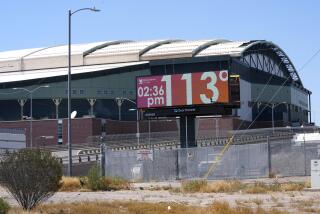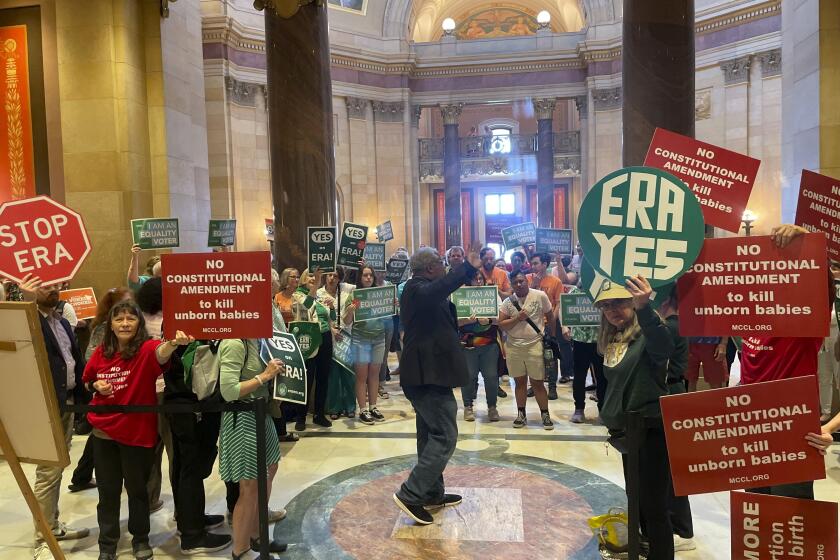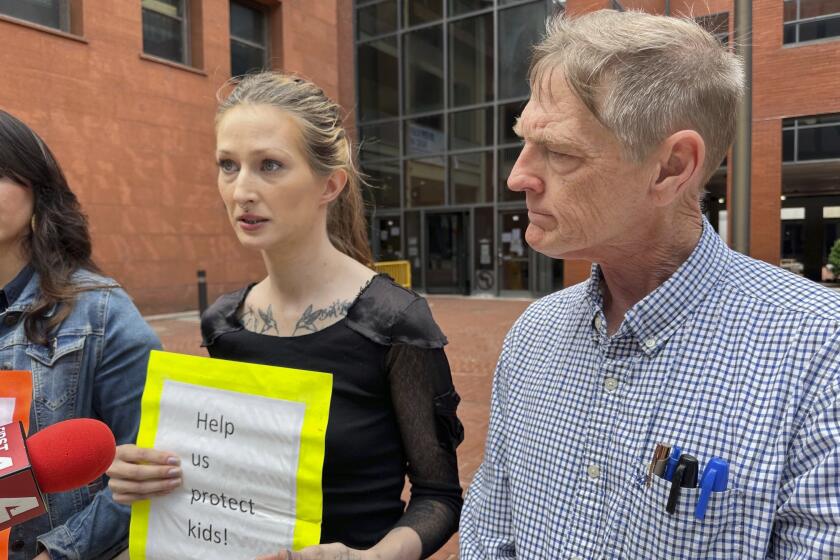GERMANY: Leaders Laud Reagan’s Resolve on Visit : Germans Laud Reagan, Warn on Cancellation : Kohl Calls Resolve to Visit Cemetery ‘Gesture of a True Friend’; Slur on WWII Soldiers Feared
Leaders of West Germany’s governing Christian Democratic Union praised President Reagan’s decision to visit a Nazi extermination camp without canceling a trip to a German military cemetery as “the gesture of a true friend.”
In a letter to 53 U.S. senators, they also warned that it would be an insult to German soldiers of World War II if Reagan changed his plans and canceled the trip to the Bitburg cemetery, near the Luxembourg border, where hundreds of German soldiers and a few dozen SS combat troops are buried.
Chancellor Helmut Kohl said Friday night that the Bitburg visit, scheduled early next month after Reagan’s trip to Bonn for an economic summit meeting, would be a symbol of reconciliation between wartime enemies, the United States and Germany.
‘Passionate Resistance’
“I am very grateful that he is carrying through with this despite passionate resistance in the U.S. Congress,” Kohl said in an interview on West German television. He called Reagan’s decision “the gesture of a true friend.”
Kohl compared Reagan’s planned visit to his own tribute last year at a French military cemetery at Verdun, burial site of Frenchmen killed fighting the Germans in an epic battle of World War I.
The warning remarks were made by Alfred Dregger, parliamentary leader of the Christian Democrats, in a letter addressed to Sen. Howard M. Metzenbaum (D-Ohio) and 52 other senators who had urged Reagan to cancel plans to visit the cemetery. The letter was published in today’s early editions of Welt am Sonntag.
The trip to Bitburg, where Reagan is to lay a wreath, has caused an international outcry among Jewish groups and the American Legion and prompted the President to add a tour of the Bergen-Belsen concentration camp to his itinerary.
Although the great majority of about 1,800 Germans buried there were regular soldiers, about 50 were members of the Waffen SS, special combat units accused of atrocities against Allied forces at the Battle of the Bulge. Jewish groups, moreover, are outraged by the symbolism involved in paying tribute to SS men of whatever function, inasmuch as other branches of the SS had responsibility for the Nazi death camps.
Dregger, the West German legislative leader, expressed different sensitivities. He said a refusal to visit the Bitburg cemetery would aid those who want to use the 40th anniversary of V-E Day, May 8, to undermine the postwar alliance between the United States and West Germany.
He said that on the last day of the war in 1945, he was a 24-year-old soldier who led his battalion in a defensive action in Silesia against a strong attack by the Soviet army. His only brother had been killed the year before on the Eastern Front.
“He was a decent young man, as were most of my comrades,” Dregger said. “When you call on your President to refrain from a noble gesture at the soldiers’ cemetery in Bitburg, I must consider that an insult to my brother and my dead comrades.”
Dregger spoke a day after Elie Wiesel, chairman of the U.S. Holocaust Committee, made an emotional appeal to Reagan in a ceremony at the White House to “find another way, another site” to visit rather than Bitburg cemetery.
On Saturday, West German opposition politicians strenuously assailed the conservative Kohl government for spurring the Bitburg visit. The Bavarian branch of the Social Democratic Party also demanded that the government ban three rallies of SS combat veterans scheduled to take place in Bavaria early next month.
In Frankfurt late Saturday, leaders of the World Jewish Congress said they will ask Chancellor Helmut Kohl to urge Reagan to cancel the visit.
“We hope to see Kohl on Sunday,” said Israel Singer, the group’s secretary general. “We shall appeal to him to urge Reagan to drop the Bitburg visit.”
A delegation of Jewish Congress leaders is traveling to Bergen-Belsen, the Nazi death camp Reagan has agreed to visit, and expects to see Kohl before the chancellor speaks at a memorial ceremony there.
Singer said his delegation will propose to Kohl that Reagan instead visit the grave of West Germany’s first postwar chancellor, Konrad Adenauer, who served from 1949 through 1962. “We have the greatest respect for Adenauer, and that would be real act of reconciliation,” Singer said.
In Israel, meanwhile, Gideon Hausner, chief prosecutor of the executed Nazi war criminal Adolf Eichmann, condemned Reagan’s planned visit, saying “it would desecrate the memory of the Jewish victims of Nazism.” Hausner, who now heads the Yad Vashem Holocaust memorial commission in Jerusalem, added that honors to SS men would be “a victory for Hitler.”
Administration officials respond to such criticism by stressing that Reagan will stay as far away as possible from SS graves during his wreath-laying ceremony.
Werner Nachmann, chairman of the Central Council of German Jews, said Reagan could have spared himself “a lot of embarrassment” by originally including a visit to a Nazi death camp along with the military cemetery stop.
“One can only form the future from knowledge of the past,” he said. “Without consciousness of this history (Nazi atrocities), the younger generation cannot guarantee that such tyranny will never recur. Therefore, we insist that the President, who is planning a gesture of reconciliation with his visit to the soldiers’ cemetery, also remember the past there--not to reopen wounds but simply to remember the victims.”
In Communist East Germany on Saturday, about 10,000 people--among them top Communist Party officials--commemorated the liberation 40 years ago of the Nazis’ Ravensbrueck death camp, the official East German news agency ADN reported.
A total of 92,000 people died at Ravensbrueck, which held women and children only, the agency said. The camp, situated about 30 miles northwest of Berlin, was freed by advancing Soviet Red Army troops, saving 17,000 inmates.
“They (the prisoners) remind us that we should spare no effort to prevent a return of fascist barbarism and also to fight with all our might for peace and a happy future for all children,” commented Kurt Hager, a member of the East German Communist Party Politburo.
East Germany contends that as a Communist state it bears no ideological link to, or moral responsibility for, the evils committed by Nazi Germany.
More to Read
Start your day right
Sign up for Essential California for news, features and recommendations from the L.A. Times and beyond in your inbox six days a week.
You may occasionally receive promotional content from the Los Angeles Times.





